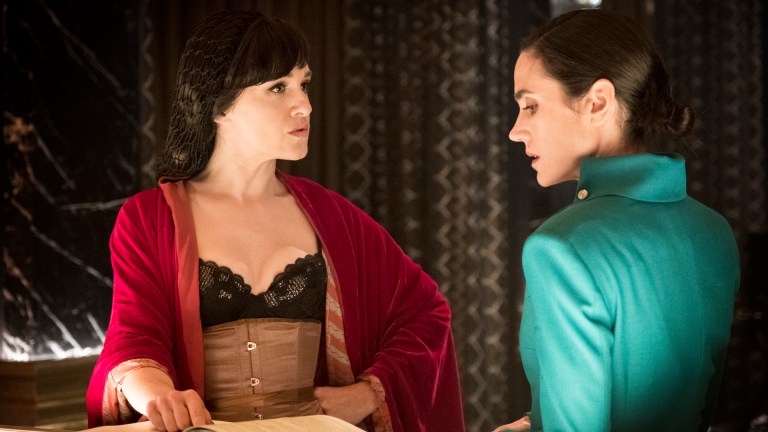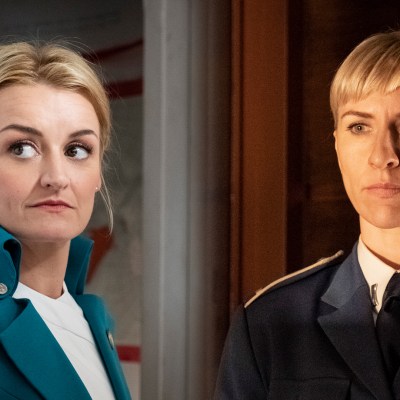Snowpiercer Episode 5 Review: Justice Never Boarded
The trial of LJ Folger is more than just a chance to solve a few murders, it's a chance for Third Class to claim its rightful seat at the table on Snowpiercer.

This Snowpiercer review contains spoilers.
Snowpiercer Episode 5
In the film Demolition Man (and yes, I’m going to go there), when someone was sentenced to a cryogenic freeze, they were essentially stored away in a block of ice, being force-fed skills by the computer that were designed to give them something useful to do with their talents upon entering society again. For someone like John Spartan, his new little skill was the ability to knit, which he uses as an apology to Huxley after offending her during a VR session gone wrong. However, one of the side effects of cryogenic freezing, which Spartan wasn’t supposed to have, were nightmares. Specifically, in Spartan’s case, he was thinking about his wife beating against the block of ice that used to be her husband.
Similarly, offenders sentenced to a stay in the Drawers on Snowpiercer aren’t given skills to use when they come back, but they’re supposed to be held in what is essentially stasis. In Nikki Genet’s case, waking her up went horribly wrong and seemed to permanently fry her brain (until her murder). In the case of Layton (Daveed Diggs), he’s being forced to remember his most horrible memories, over and over again, until he’s freed from the drawers in a daring rescue and whisked off to Third Class to recover. A Third Class car that, given the developments of the LJ Folger (Annalise Basso) case, is much more sympathetic to his cause than they were just a few days prior.
One of the better things that Snowpiercer has done is establish just how tenuous Melanie’s hold on the train is, and just how much that hold depends on the shared fiction that the benevolent Mr. Wilford is at the head, guiding things along and making sure the last vestige of humanity travels safely around the world. Whenever any of the ticketed classes agitates for something, it’s up to Melanie (Jennifer Connelly) via Wilford to either boost it up, as she does this week with Third Class’s demand to be included in the trial of LJ Folger, or to tamp it down, as she does First Class’s distress at losing a seat on the jury to the poor people in Third. Melanie, it seems, is the only person who can keep order on the train, and the pressure is clearly beginning to get to her as Third Class and First Class prepare for open warfare against one another with Second Class passengers like Jinju (Susan Park) and the newly promoted Till (Mickey Sumner) trapped in between the people whose money paid for the train and the people who make sure the train keeps running and food keeps growing.
LJ’s trial, and the politicking around it, are clearly putting pressure on Melanie, who is trying to keep order in a system where inequality demands disorder. Between the Tail and Third Class wanting more power and First Class being a snake’s nest of politicians, it’s clear why Melanie looks stressed, and Jennifer Connelly does a wonderful job of communicating that internal struggle on Melanie’s face throughout the episode. She’s not unsympathetic to Third Class, and in Wilford’s original rules they’ve every right to petition for a seat at the table owing to the criminal proceedings, but Lilah (Kerry O’Malley) is actively scheming to undermine her authority within First Class and, eventually, force her removal from power (and potentially, the train itself). Connelly’s performance is really well done. She shows more about her character’s state of mind through her eyes and little slips and tightens in her expressions than could be said, and the subtle, practiced coldness of the character serves her role well.
When she drops her mask and allows herself to be something other than the face of Mr. Wilford, it’s effective. LJ, the other key figure in this trial, works in exactly the opposite way, but Annalise Basso is equally skilled at her ability to turn on and shut off LJ’s emotions as needed for her story. She’s cold or bored when she’s one-on-one with Melanie or Roche (Mike O’Malley), but when it’s time to turn on the tears, she gives the assembled courtroom just enough tears, just enough angst, without going too far overboard to scuttle her own cause. Her only downfall is, well, her collection of dried, preserved penises cut off her Third Class conquests.
That’s a nifty little element that the show wisely held close to the vest until busting it out at the tribunal, and it’s the little detail that completely undoes LJ’s story of being in thrall of Eric. Serial killers are often collectors, and that’s what does LJ in. That, combined with Chinaka Hodge’s script, really puts over that LJ is a monster, particularly when Lilah reveals to Melanie during a heated discussion regarding Lilah’s plotting that LJ is the reason why her father has a glass eye (another horrifying reveal that only gets more terrible when LJ pops the glass eye into her mouth). The other elements, like Till’s shift in loyalties, and the disagreements at the front of the train over how to handle the situation down train, are all solidly written, but it’s the daring escape to and from the drawers, and the gut-churning trial, that draw the heaviest weight in the episode.
The trial is pure circus, with the First Class dining car crammed full of people, an with Ruth as the judge, such as it is. There’s no real jurisprudence, everyone just tells what they say, or their side of the story, with a few character witnesses for the dead, and things move on from there and the three jurors deliberate and decide on the fate of the accused. However, Frederick E.O. Toye makes sure to establish the the trial, much like trials in our world, is more than just entertainment. Third Class sees the trial as their chance to get justice, and a seat at the table, while First Class (Lilah in particular) sees the trial as a threat to their higher status at the front of the train. It’s not so much about luxuries, but it’s about maintaining a status as being above the laws of Snowpiercer, no matter what Wilford, Melanie, or anyone else has to say about it. First Class won’t have violent demonstrations, First Class just arranges a coup d’etat, and Melanie is trapped between these two potentially devastating outcomes. Toye also does a solid job handling the rescue of Layton from the Drawers, and his nightmare sequence as he comes out of stasis (the way his eyes snap open at the very end of the episode is a beautiful bit of editing, and kudos to Daveed Diggs for his physical acting within the coma and recovery).
Snowpiercer never quite rises above the level of very good, but that’s not a slight. Most shows can’t even manage that for a sustained run. “Justice Never Boarded,” by leaning into its procedural roots and digging into the sort of gory murder details that make shows like Law and Order; SVU popular, elevates itself over its usual status, by giving us, and riveted Third Class passengers, the horrifying true crime details viewers crave these days. If it bleeds, it leads, even on a train car 1,001 cars long.


